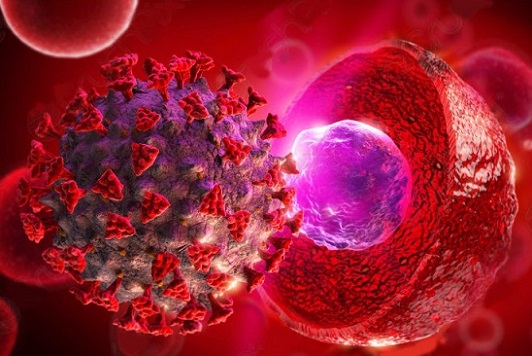Nikhil Prasad Fact checked by:Thailand Medical News Team Oct 11, 2025 4 months, 2 weeks, 1 day, 21 hours, 4 minutes ago
Medical News: SARS-CoV-2 and the 2B4 Pathway
A groundbreaking study conducted by researchers from Binzhou Medical University, the Institute for Immunology at the Chinese Institutes for Medical Research, Ludong University, Hainan Cell Medical Technology Co., Shandong Antaien Biotechnology Co., and Guizhou University of Traditional Chinese Medicine has uncovered how the immune receptor 2B4, also known as CD244, plays a pivotal role in the way SARS-CoV-2 affects the human immune system. Their findings suggest that this same mechanism may also increase the risk of cancer in those exposed to the virus.
 SARS-CoV-2 Disrupts 2B4 Immune Pathway and Triggers Cancer Risk
SARS-CoV-2 Disrupts 2B4 Immune Pathway and Triggers Cancer Risk
In this
Medical News report, scientists revealed that 2B4 acts as a master switch that determines whether the immune system activates or suppresses its attack against infected or cancerous cells. Under normal circumstances, 2B4 helps natural killer (NK) cells and CD8+ T cells destroy threats. However, when hijacked by SARS-CoV-2, this receptor becomes an instrument of suppression, weakening immune defenses and paving the way for prolonged infection and possible tumor formation.
How SARS-CoV-2 Hijacks the Immune System
During severe COVID-19, immune cells display unusually high levels of 2B4 and its partner molecule CD48. This excessive activation pushes cells into exhaustion, leading to reduced production of perforin and granzyme—two vital proteins used to kill virus-infected or cancerous cells. Instead of helping, 2B4 begins to silence immune responses, resulting in viral persistence and the inability to eliminate abnormal cells.
The key to this shift lies in the balance between activating and inhibitory molecules inside immune cells. When 2B4 binds to a protein called SAP, it triggers a defensive response. But when it links instead to inhibitory proteins such as SHP-1 and SHP-2, the immune system slows down. SARS-CoV-2 appears to exploit this switch, keeping the immune system trapped in a suppressed state that mirrors patterns seen in chronic viral infections and certain cancers.
Connection Between 2B4, Cancer, and Long-Term COVID Effects
The researchers found striking similarities between the immune suppression seen in COVID-19 and that in cancers such as melanoma, multiple myeloma, glioma, and pancreatic cancer. High expression of 2B4 in these diseases is known to promote tumor growth by preventing immune cells from attacking cancer cells effectively. This raises concerns that individuals with lingering SARS-CoV-2 infections or long COVID may face an increased risk of developing cancer or of worsening existing malignancies.
Long COVID, characterized by persistent fatigue, inflammation, and immune dysfunction, may also stem from the same mechanism. Overexpression of 2B4 and PD-1 in immune cells has been observed months after initial infection, suggesting that this molecular exhaustion could explain many of the chronic symptoms reported by survivors.
Therapeutic Implications and Future Prospects
The research team pr
oposed that targeting the 2B4-CD48 pathway could become a key strategy in treating both COVID-19 and cancer. Blocking this pathway may help reinvigorate exhausted immune cells and restore their ability to fight infections and tumors. Some early experimental therapies that use anti-2B4 antibodies have already shown encouraging results in reactivating the body’s natural killer and T cells.
However, because 2B4 can both stimulate and suppress immune responses, scientists warn that therapies must be carefully balanced. Excessive activation could lead to harmful inflammation, while over-inhibition could cause immune paralysis. Future treatments might therefore combine 2B4 inhibitors with PD-1 blockers or other immune checkpoint therapies to fine-tune immune recovery.
The study findings were published in the peer reviewed journal: ImmunoTargets and Therapy.
https://www.dovepress.com/2b4cd244-signaling-in-immune-regulation-and-its-role-in-infection-canc-peer-reviewed-fulltext-article-I
Overall, the research reveals that SARS-CoV-2 does more than cause respiratory illness—it disrupts fundamental immune control systems, potentially leading to long-term health issues including cancer. Understanding and targeting the 2B4 pathway may pave the way for new therapies that restore immunity, prevent chronic disease, and improve outcomes for both COVID-19 and cancer patients.
For the latest on COVID-19, keep on logging to Thailand
Medical News.
Read Also:
https://www.thailandmedical.news/news/breaking-covid-19-news-polish-review-study-shows-that-sars-cov-2-infections-are-a-potential-risk-factor-for-the-development-of-cancer
https://www.thailandmedical.news/news/covid-19-increases-risk-of-hpv-linked-cancers
https://www.thailandmedical.news/news/higher-risk-of-colon-cancer-in-covid-19-survivors-with-shingles
